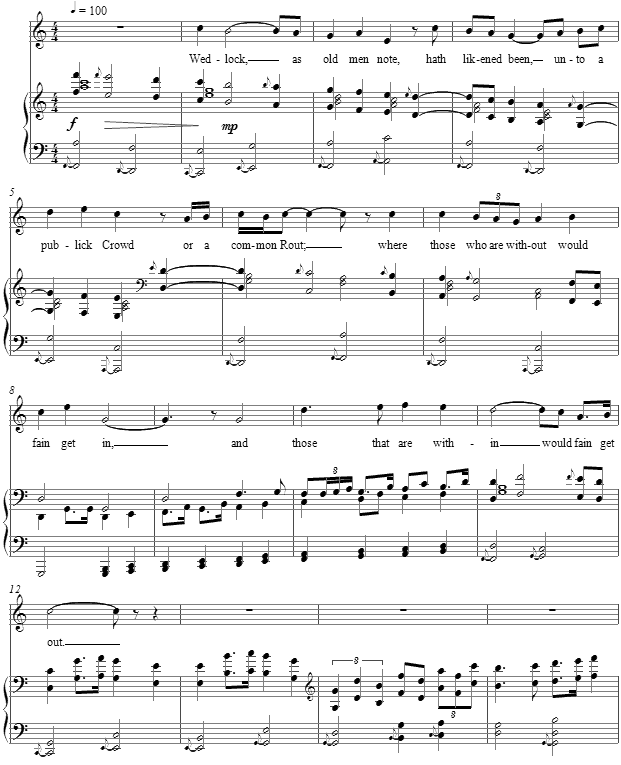Music and Texts of GARY BACHLUND
Vocal Music | Piano | Organ | Chamber Music | Orchestral | Articles and Commentary | Poems and Stories | Miscellany | FAQs
Wedlock - (2007)
Benjamin Franklin
for medium voice and piano
Wedlock, as old Men note, hath likened been,
Unto a publick Crowd or common Rout;
Where those that are without would fain get in,
And those that are within would fain get out.
Grief often treads upon the Heels of Pleasure,
Marry’d in Haste, we oft repent at Leisure;
Some by Experience find these Words misplac’ed,
Marry’d at Leisure, they repent in Haste.[ 3 pages, circa 1' 50" ]
Benjamin Franklin (1706-1790)
Benjamin Franklin was one of the best-known "Founding Fathers" of the United States. He was a leading author, political theorist, politician, printer, scientist, inventor, civic activist, and diplomat. As a scientist he was a major figure in the history of physics for his discoveries and theories regarding electricity. As a political writer and activist he, more than anyone, invented the idea of an American nation, and as a diplomat during the American Revolution, he secured the French alliance that helped to make independence possible.
Franklin was noted for his curiosity, his writings (popular, political and scientific), and his diversity of interests. As a leader of the Enlightenment, he gained the recognition of scientists and intellectuals across Europe. An agent in London before the Revolution, and Minister to France during the war, he, more than anyone else, defined the new nation in the minds of Europe. His success in securing French military and financial aid was a great contributor to the American victory over Britain. He invented the lightning rod, bifocals, the iron furnace stove (also known as the Franklin stove), a carriage odometer and a musical instrument known as the "armonica." He was an early proponent of colonial unity.
This text is found in Franklin's almanac entry for "III Mon. May (1734) hath xxxi days," it has been observed that the poem was "closely adapted" from William Congreve’s The Old Batchelour (1693), V.1. In the perennial battle of the sexes, the male's perspective is often as above, wherein first pleasures are sometimes replaced by lengthy "grief." Whether one marries in haste to repent at leisure or marries at leisure to repent in haste, Franklin's (and Congreve's) observation is that this is simply an age-old theme. One might therefore cynically emphasize the second syllable, "lock," of wedlock.
The first measure and then continuing falling musical line in the accompaniment is meant to suggest that the more rhapsodic emotion falls away. The return to a higher register is therefore accomplished by different gestures.
The score for is available as a free PDF download, though any major commercial performance or recording of the work is prohibited without prior arrangement with the composer. Click on the graphics below for this piano-vocal score.

